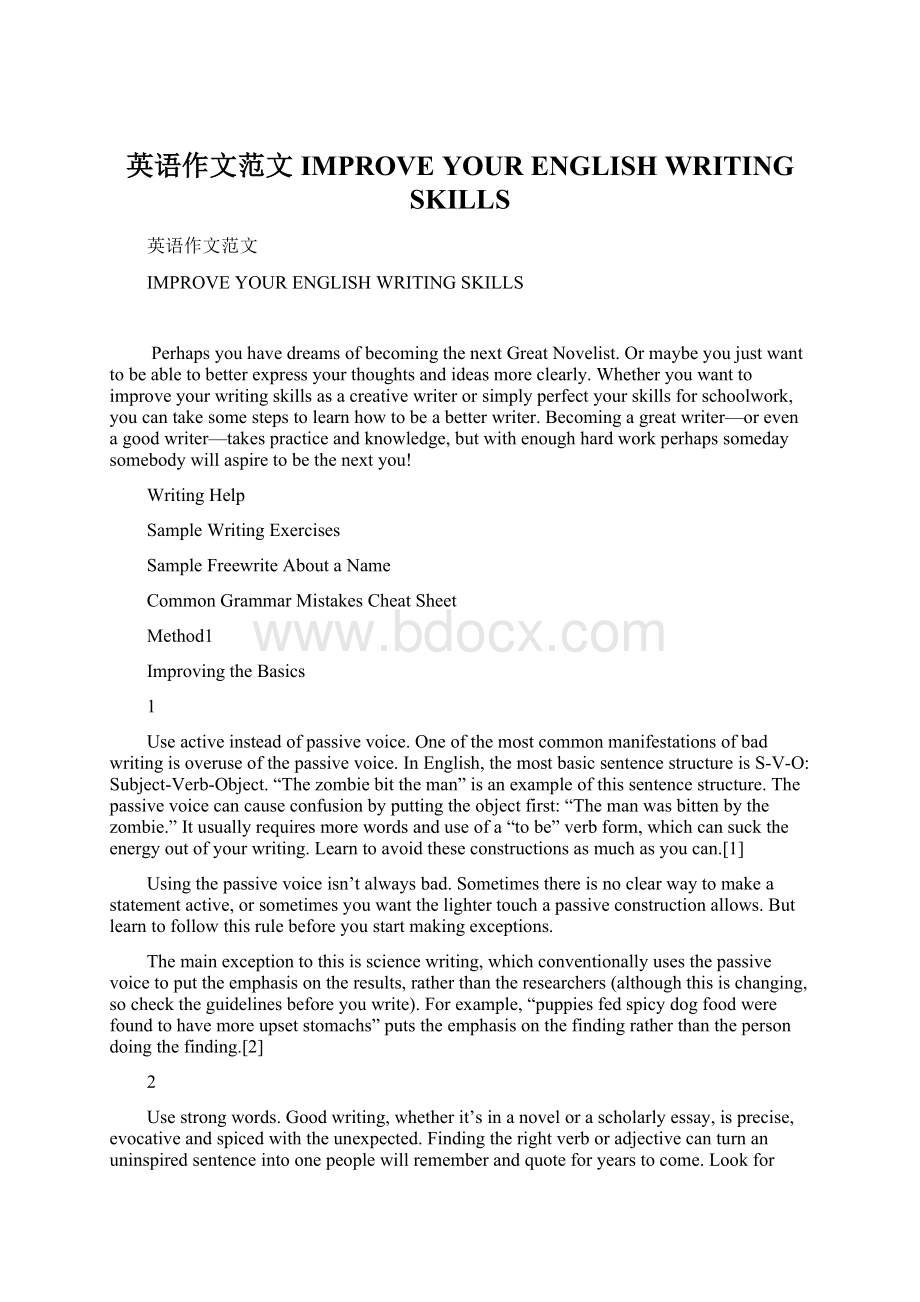英语作文范文IMPROVE YOUR ENGLISH WRITING SKILLS.docx
《英语作文范文IMPROVE YOUR ENGLISH WRITING SKILLS.docx》由会员分享,可在线阅读,更多相关《英语作文范文IMPROVE YOUR ENGLISH WRITING SKILLS.docx(4页珍藏版)》请在冰豆网上搜索。

英语作文范文IMPROVEYOURENGLISHWRITINGSKILLS
英语作文范文
IMPROVEYOURENGLISHWRITINGSKILLS
PerhapsyouhavedreamsofbecomingthenextGreatNovelist.Ormaybeyoujustwanttobeabletobetterexpressyourthoughtsandideasmoreclearly.Whetheryouwanttoimproveyourwritingskillsasacreativewriterorsimplyperfectyourskillsforschoolwork,youcantakesomestepstolearnhowtobeabetterwriter.Becomingagreatwriter—orevenagoodwriter—takespracticeandknowledge,butwithenoughhardworkperhapssomedaysomebodywillaspiretobethenext you!
WritingHelp
SampleWritingExercises
SampleFreewriteAboutaName
CommonGrammarMistakesCheatSheet
Method1
ImprovingtheBasics
1
Useactiveinsteadofpassivevoice. Oneofthemostcommonmanifestationsofbadwritingisoveruseofthepassivevoice.InEnglish,themostbasicsentencestructureisS-V-O:
Subject-Verb-Object.“Thezombiebittheman”isanexampleofthissentencestructure.Thepassivevoicecancauseconfusionbyputtingtheobjectfirst:
“Themanwasbittenbythezombie.”Itusuallyrequiresmorewordsanduseofa“tobe”verbform,whichcansucktheenergyoutofyourwriting.Learntoavoidtheseconstructionsasmuchasyoucan.[1]
Usingthepassivevoiceisn’talwaysbad.Sometimesthereisnoclearwaytomakeastatementactive,orsometimesyouwantthelightertouchapassiveconstructionallows.Butlearntofollowthisrulebeforeyoustartmakingexceptions.
Themainexceptiontothisissciencewriting,whichconventionallyusesthepassivevoicetoputtheemphasisontheresults,ratherthantheresearchers(althoughthisischanging,sochecktheguidelinesbeforeyouwrite).Forexample,“puppiesfedspicydogfoodwerefoundtohavemoreupsetstomachs”putstheemphasisonthefindingratherthanthepersondoingthefinding.[2]
2
Usestrongwords. Goodwriting,whetherit’sinanovelorascholarlyessay,isprecise,evocativeandspicedwiththeunexpected.Findingtherightverboradjectivecanturnanuninspiredsentenceintoonepeoplewillrememberandquoteforyearstocome.Lookforwordsthatareasspecificaspossible.Trynottorepeatthesamewordoverandoverunlessyouaretryingtobuildarhythmwithit.
Oneexceptiontothisisthewordsusedtodescribedialogue.Badwritingisfilledwith“hecommented”and“sheopined.”Awell-placed“sputtered”canworkwonders,butmostofthetimeasimple“said”willdo.Itmayfeelawkwardtousetheword“said”overandover,butchangingitupunnecessarilymakesitharderforyourreaderstogetintotheback-and-forthflowoftheconversation.“Hesaid/shesaid”becomesnearlyinvisibletoyourreadersafterawhile,allowingthemtostayfocusedonthecharacters’voices.[3]
Strongdoesn’tmeanobscure,ormorecomplicated.Don’tsay“utilize”whenyoucouldsay“use.”“Hesprinted”isnotnecessarilybetterthan“heran.”Ifyouhaveareallygoodopportunitytouse“ameliorate,”goforit—unless“ease”isjustasgoodthere.
Thesaurusescanbehandy,butusethemwithcaution.ConsiderthepredicamentJoeyfrom Friends getsintowhenheusesathesauruswithoutalsoconsultingadictionary:
“They’rewarm,nicepeoplewithbighearts”becomes“They’rehumid,prepossessinghomosapienswithfull-sizedaorticpumps.”[4] Ifyou’regoingtouseathesaurustospiceupyourvocabulary,lookupyournewwordsinthedictionarytodeterminetheirprecisemeaning.
3
Cutthechaff. Goodwritingissimple,clearanddirect.Youdon’tgetpointsforsayingin50wordswhatcouldbesaidin20,orforusingmulti-syllablewordswhenashortonedoesjustaswell.Goodwritingisaboutusingtherightwords,notfillingupthepage.Itmightfeelgoodatfirsttopackalotofideasanddetailsintoasinglesentence,butchancesarethatsentenceisjustgoingtobehardtoread.Ifaphrasedoesn’taddanythingvaluable,justcutit.[5]
Adverbsaretheclassiccrutchofmediocrewriting,andtheyoftenserveonlytoclutterupasentence.Awell-placedadverbcanbedelightful,butmuchofthetimetheadverbsweusearealreadyimpliedbytheverboradjective—orwouldbeifwehadchosenamoreevocativeword.Don’twrite“screamedfearfully”--“scream”alreadysuggestsfear.Ifyounoticethatyourwritingisfilledwith“-ly”words,itmightbetimetotakeadeepbreathandgiveyourwritingmorefocus.[6]
Sometimescuttingthechaffisbestdoneattheeditingstage.Youdon’thavetoobsessaboutfindingthemostconcisewaytophraseeverysentence;getyourideasdownonpaperhoweveryoucanandthengothroughtoeditoutunnecessarystuff.
Yourwritingdoesn’tjustexistinavacuum—it’sexperiencedinconjunctionwiththereader’simagination.Youdon’tneedtodescribeeverydetailifafewgoodonescanspurthereader’smindtofillintherest.Laydownwell-placeddotsandletthereaderconnectthem.
4
Show,don’ttell. Don’t tell yourreadersanythingthatcouldbeshowninstead.Insteadofjustsittingyourreadersdownforalongexpositionexplainingacharacter’sbackgroundoraplot-point’ssignificance,trytoletthereadersdiscoverthesameideasthroughthewords,feelingsandactionsofyourcharacters.Especiallyinfiction,puttingthisclassicpieceofwritingadviceintopracticeisoneofthemostpowerfullessonsawritercanlearn.[7]
Forexample,“Sydneywasangryafterreadingtheletter”tellsthereaderthatSydneyfeltangry,butdoesn’tgiveusanywaytoseeitforourselves.It’slazyandunconvincing.“Sydneycrumpledtheletterandthrewitintothefireplacebeforeshestormedfromtheroom” shows thatSydneywasangrywithouthavingtosayitoutright.Thisisfarmoreeffective.Readersbelievewhatwesee,notwhatwe’retold.
5
Avoidclichés. Clichésarephrases,ideasorsituationsthathavebeenusedsooftenthatthey’velostanyimpacttheyoncehad.[8] They’realsousuallytoogeneraltoleavealastingimpressiononyourreader.Whetheryou’rewritingfictionornonfiction,cuttingclichésoutofyourworkwillmakeitbetter.[9]
“Itwasadarkandstormynight”isaclassicexampleofaclichédphrase—evennowaclichédconcept.Comparethesesimilarweather-relatedopeninglines:
[10]
“ItwasabrightcolddayinApril,andtheclockswerestrikingthirteen.”—1984,byGeorgeOrwell.It’snotdark,norstormy,nornight.Butyoucantellrightfromthestartsomething’snotquiterightin1984.
“Theskyabovetheportwasthecoloroftelevision,tunedtoadeadchannel.”—Neuromancer,byWilliamGibson,inthesamebookthatgaveustheword“cyberspace.”Thisnotonlygivesyoutheweatherreport,itdoessoinsuchawaythatyouareimmediatelyplacedintohisdystopianworld.
““Itwasthebestoftimes,itwastheworstoftimes,itwastheageofwisdom,itwastheageoffoolishness,itwastheepochofbelief,itwastheepochofincredulity,itwastheseasonofLight,itwastheseasonofDarkness,itwasthespringofhope,itwasthewinterofdespair,wehadeverythingbeforeus,wehadnothingbeforeus,wewereallgoingdirecttoHeaven,wewereallgoingdirecttheotherway—inshort,theperiodwassofarlikethepresentperiod,thatsomeofitsnoisiestauthoritiesinsistedonitsbeingreceived,forgoodorforevil,inthesuperlativedegreeofcomparisononly.”—ATaleofTwoCities,byCharlesDickens.Weather,emotion,damnation,anddespair—Dickenscovereditallwithanopeninglinethatleavesthereaderreadyforanything.
Clichésarealsoimportanttoavoidwhenyou’rewritingaboutyourself.Sayingyou’rea“peopleperson”saysnothingdefiniteaboutyou.Sayingyou’reabletocommunicatewellwithavarietyofpeoplebecauseyougrewupinabilingualfamilyandlivedinsixcountriesgrowingupletsyourreaderknowyou’rea“peopleperson”withoutyourelyingonlazylanguage.
6
Avoidgeneralizations. Oneofthehallmarksofsloppywritingisbroadgeneralizations.Forexample,anacademicessaymightsaysomethinglike“Inmoderntimes,wearemoreprogressivethanpeopleahundredyearsago.”Thisstatementmakesahostofunfoundedassumptionsanddoesn’tdefineimportantideaslike“progressive.”Bepreciseandspecific.Whetheryou’rewritingashortstoryorascholarlyessay,steeringclearofgeneralizationsanduniversalstatementswillimproveyourwriting.
Thisappliestocreativewriting,too.Don’tallowyourselftoassumeanythingwithoutexaminingit.Forexample,ifyou’rewritingastoryaboutafemalecharacter,don’tassumethatshewouldautomaticallybemoreemotionalthanamanormoreinclinedtobegentleorkindly.Thiskindofnon-examinedthinkingkeepsyouinacreativerutandpreventsyoufromexploringthevarietyofpossibilitiesthatreallifepresents.
7
Backupwhatyousay. Don’tspeculatewithoutprovidingevidenceforyourassertions.Increativewritingterms,thisissimilartothe“show,don’ttell”principle.Don’tjust say thatwithoutastrongpoliceforcesocietyasweknowitwouldbreakdown.Whyisthattrue?
Whatevidencedoyouhave?
Explainingthethinkingbehindyourstatementswillallowreaderstoseethatyouknowwhatyou’retalkingabout.Itwillalsohelpthemdeterminewhethertheyagreewithyou.
8
Usemetaphorsandsimileswithcaution. Whileagoodmetaphororsimilecangiveyourwritingpunchandvigor,abadonecanmakeyourwritingasweakasababy.(That,bytheway,wasaweaksimile.)Overusingmetaphorsandsimilescanalsosuggestthatyouaren’tconfidentwithwhatyou’resayingandarerelyingonfiguresofspeechtoexplainyourideas.Theycanalsobecomeclichédreallyquickly.
A“mixed”metaphormixestwometaphorssothattheydon’tmakesense.Forexample,“We’llburnthatbridgewhenwecometoit”mixesthecommonmetaphor“We’l